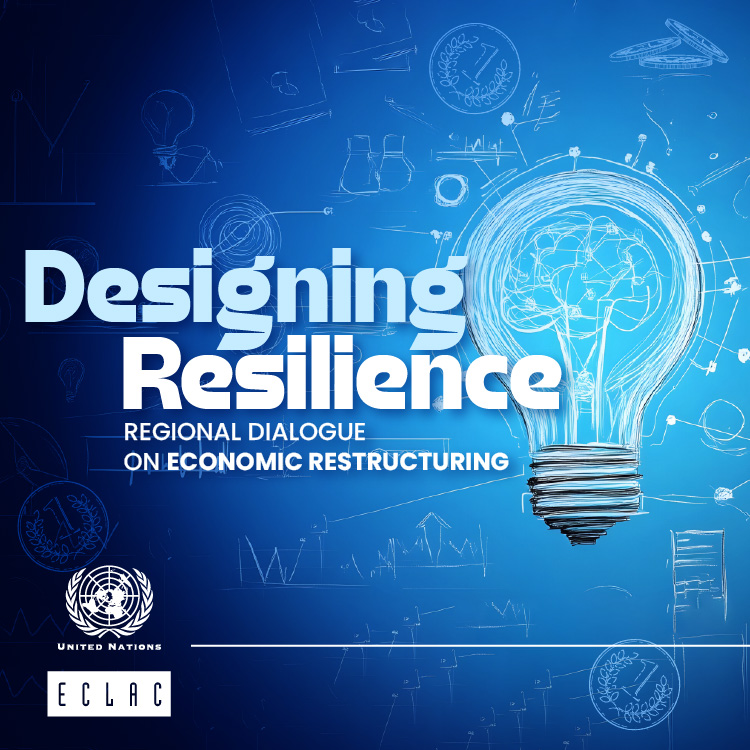Designing Resilience: Regional Dialogue on Economic Restructuring
Resumen
Presentations identifying the major impacts of the COVID-19 pandemic on the tourism and related sectors and providing a dais for strategic resilience building policy prescriptions for fueling both economic growth and convergence in the tourism-dependent economies of Antigua and Barbuda, Dominica, Grenada, Saint Kitts and Nevis, Saint Lucia, and Saint Vincent and the Grenadines.
Información del evento

Fecha
5 Dic 2025, 09:00 - 16:00Tipo de evento
Participación
Background
Persistent structural challenges have hindered the Caribbean’s growth and development. The geographic isolation, small economic bases, environmental fragility, and climate risks that characterize sub-regional economies have long stalled development. The pandemic further delayed structural transformation, intensifying debt burdens, narrowing fiscal space, and exacerbating lingering climate-related damages. These are compounded by limited access to development financing, which further limits avenues for structural change. Rising debt servicing costs, which is conditioned by scarcity of affordable capital, and a lack of tailored financial instruments for Caribbean small island developing states continue to obstruct developmental progress, entrenching poverty and inequality. Debt servicing alone consumes up to 40% of government revenue, crowding out investment in long-term development, productivity, competitiveness, and resilience-building. In the absence of robust structural reform, development will remain constrained—and the sub-region locked in a cycle of incremental developmental gains, insufficient to meet the region’s evolving challenges.
The subregion’s economic fragility has also been rooted in its heavy over-reliance on tourism, a vulnerability laid bare by the near economic shutdown during the COVID-19 pandemic. In 2019, tourism contributed 28.5% of the Caribbean’s GDP, with some economies deriving up to 73.6% of GDP from tourism and related sectors. The industry also accounts for one in six jobs, the majority held by women. To compete in international markets and generate additional capital for development, this model must by necessity evolve.
The upcoming regional dialogue aims to promote resilience and economic diversification across similar contexts by convening stakeholders from both beneficiary and non-beneficiary Caribbean countries to dissect the shared lessons and scalable practices derived from the four(4) key outputs of Outcome 1 for the beneficiary countries—Antigua and Barbuda, Dominica, Grenada, Saint Kitts and Nevis, Saint Lucia, and Saint Vincent and the Grenadines:
- Two (2) Country reports on the impacts of COVID-19 and strategies for tourism diversification and resilience building, namely:
- Building post-pandemic economic resilience by diversifying tourism: The case of Antigua and Barbuda, Saint Kitts and Nevis and Saint Lucia
- Post-Covid Building Back Better in Tourism-Dependent Economies: Dominica, Grenada and St. Vincent and the Grenadines
- Final policy framework for economic restructuring and sectoral upgrading
- A Feasibility study on establishing English Harbour in Antigua and Barbuda as a tourism-driven growth pole
- ECLAC’s Land Use Scenario Report for Antigua and Barbuda.
Objectives
The objectives of the regional dialogue for economic restructuring include:
- Present the tourism diversification reports, final policy framework, feasibility study, and land use scenario report
- Engage stakeholders in evaluating the feasibility, coherence, and implementation pathways of proposed strategies
- Facilitate cross-country learning, enabling non-beneficiary countries to draw insights—particularly from Antigua’s growth pole initiative
- Enhance the capacity of all participating countries to promote a more diversified and resilient economic base
Expected Outcomes
- Strengthened capacity to pursue economic diversification across beneficiary and non-beneficiary countries
- Data-driven policy recommendations to support tourism, broader economic development, and global competitiveness
- Increased regional knowledge-sharing and networking among Caribbean SIDS
- Deepened collaboration between UN ECLAC, beneficiary governments, and regional partners
Agenda
Provisional Programme
Trinidad and Tobago time (GMT-4)
| Time | Activity / Details |
|---|---|
| 9.00–9.15 a.m. | Opening of the meeting • Welcome remarks by Miosotis Rivas Peña, Director, ECLAC Subregional Headquarters for the Caribbean • Everly Paul Chet Greene, Minister of Foreign Affairs, International Trade and Immigration, Antigua and Barbuda |
| 9.15–10.00 a.m. | Presentation – Building post-pandemic economic resilience by diversifying tourism: the case of Antigua and Barbuda, Saint Kitts and Nevis and Saint Lucia Moderator: Alva Baptiste, Minister for External Affairs, International Trade, Civil Aviation and Diaspora Affairs, Saint Lucia Presenters: • Sheldon McLean, Coordinator, Economic Development Unit, ECLAC • Rochelle Harris, Consultant |
| 10.15–11.00 a.m. | Presentation – The Building Back Better Report in tourism-dependent economies: Dominica, Grenada and Saint Vincent and the Grenadines Moderator: Alva Baptiste, Minister for External Affairs, International Trade, Civil Aviation and Diaspora Affairs, Saint Lucia Presenters: • Indera Sagewan, Consultant, Trinidad and Tobago • Representative of the Economic Development Unit, ECLAC |
| 11.00–11.45 a.m. | Presentation – ECLAC’s Land Use Scenario Report for Antigua and Barbuda Moderator: Everly Paul Chet Greene, Minister of Foreign Affairs, Trade and Barbuda Affairs, Antigua and Barbuda Presenter: • Lucia Mings, Managing Director, Environment Tourism Consulting Ltd., Consultant, Antigua and Barbuda |
| 11.45 a.m.–12.30 p.m. | Review and Feedback on Presentations Moderator: Alva Baptiste, Minister for External Affairs, International Trade, Civil Aviation and Diaspora Affairs, Saint Lucia |
| 12.30–1.30 p.m. | Lunch break |
| 1.30–2.15 p.m. | Presentation – Feasibility study on establishing English Harbour in Antigua and Barbuda as a tourism-driven growth pole Moderator: Everly Paul Chet Greene, Minister of Foreign Affairs and Foreign Trade, International Trade and Immigration, Antigua and Barbuda Presenter: • Martin Franklin, Consultant, Trinidad and Tobago |
| 2.15–3.00 p.m. | Presentation – Tourism Final Policy Framework Moderator: Alva Baptiste, Minister for External Affairs, International Trade, Civil Aviation and Diaspora Affairs, Saint Lucia Presenter: • Vanus James, Consultant, Trinidad and Tobago |
| 3.00–3.45 p.m. | Discussion with Member State Stakeholders Moderator: Alva Baptiste, Minister for External Affairs, International Trade, Civil Aviation and Diaspora Affairs, Saint Lucia |
| 3.45–4.00 p.m. | Closure of the meeting • Statement by Miosotis Rivas Peña, Director, ECLAC Subregional Headquarters for the Caribbean |
Sede(s) subregional(es) y oficina(s)
Adjunto(s)
Enlace(s) relacionado(s)
Institución organizadora
ECLAC Subregional Headquarters for the Caribbean
- http://www.cepal.org/en/headquarters-and-offices/eclac-caribbean
- (868)224-8000